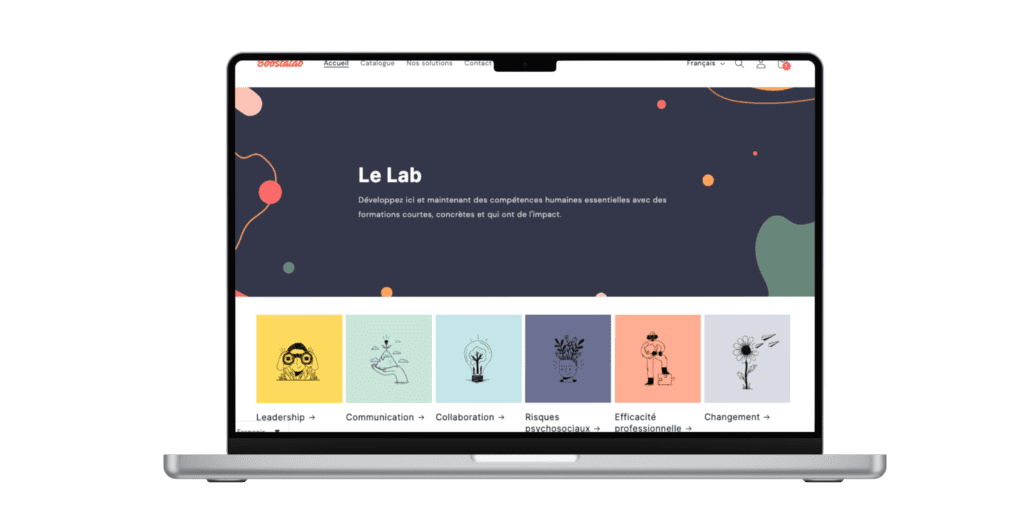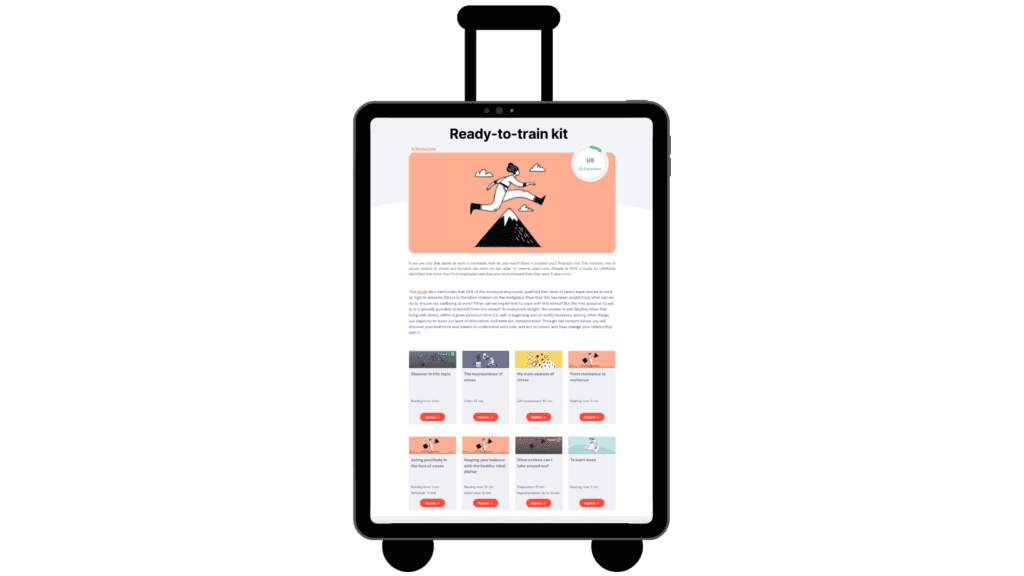Constructive Feedback Training: Turn Discomfort Into Growth
Constructive feedback
Whether it is spontaneous or planned, constructive feedback leaves no one indifferent! While some may feel uncomfortable giving or receiving it, it is a powerful development catalyst. By maximizing the potential of each individual, feedback allows us to become better versions of ourselves and to propel work teams to new heights!

Why develop feedback practices?
Do you remember the last time you received constructive feedback? How did it make you feel?
Often perceived as a source of stress and discomfort, feedback remains a necessary tool for any team wishing to excel. Therefore, it is important to debunk the fears associated with feedback, but also to better master how to ask for it, offer it, and receive it in order to use it as a professional springboard.
We are ready to help you become feedback professionals and thereby enable everyone to surpass themselves on a daily basis!
Intended results

The beliefs surrounding constructive feedback have been dismantled to make it accessible to all

Preparation for feedback meetings is simplified and the desired outcome is nothing but positive

Each team member knows how to ask for and receive feedback in order to be an active participant in their own development
All you need to know about our constructive feedback training to turn discomfort into growth
Why is constructive feedback so important in the workplace?
Because well-delivered feedback is a powerful tool for growth! When it’s clear, constructive, and focused on improvement, it helps teams develop, avoid misunderstandings, and strengthen collaboration.
Good feedback allows you to:
✔ Gain a better understanding of your strengths and areas for improvement.
✔ Build a culture of trust and transparency.
✔ Boost motivation and engagement.
✔ Improve team performance through continuous learning.
Feedback isn’t criticism—it’s an opportunity!
Because well-delivered feedback is a powerful tool for growth! When it’s clear, constructive, and focused on improvement, it helps teams develop, avoid misunderstandings, and strengthen collaboration.
Good feedback allows you to:
✔ Gain a better understanding of your strengths and areas for improvement.
✔ Build a culture of trust and transparency.
✔ Boost motivation and engagement.
✔ Improve team performance through continuous learning.
Feedback isn’t criticism—it’s an opportunity!
How can I foster a feedback culture in my team?
Creating a feedback culture isn’t just about giving advice once in a while—it’s a mindset!
Here are some simple yet effective practices:
✔ Value positive feedback just as much as corrective feedback.
✔ Encourage employees to ask for feedback, not just receive it.
✔ Set aside dedicated moments for feedback (e.g., meetings, one-on-one check-ins).
✔ Lead by example—managers should also be open to receiving feedback!
With the right approach and tools, feedback becomes a natural habit that enhances both performance and team well-being.
Creating a feedback culture isn’t just about giving advice once in a while—it’s a mindset!
Here are some simple yet effective practices:
✔ Value positive feedback just as much as corrective feedback.
✔ Encourage employees to ask for feedback, not just receive it.
✔ Set aside dedicated moments for feedback (e.g., meetings, one-on-one check-ins).
✔ Lead by example—managers should also be open to receiving feedback!
With the right approach and tools, feedback becomes a natural habit that enhances both performance and team well-being.
What’s the best way to learn how to give great feedback?
At Boostalab, we don’t believe in passive learning where you listen but never apply. The best way to learn the art of feedback is to practice it!
Explore our learning solutions to master constructive feedback:
✔ Le Lab – An online learning platform available anytime to help you integrate best practices gradually.
✔ Training boosts – A hands-on group workshop designed to build strong feedback habits.
✔ Interactive team training paths – A longer-term coaching program to embed a lasting feedback culture within your company.
✔ Ready-to-train kits – Engaging and practical training content, ready to be integrated into your organization’s LMS.
Not sure which format is best for your team? Take the quiz!
At Boostalab, we don’t believe in passive learning where you listen but never apply. The best way to learn the art of feedback is to practice it!
Explore our learning solutions to master constructive feedback:
✔ Le Lab – An online learning platform available anytime to help you integrate best practices gradually.
✔ Training boosts – A hands-on group workshop designed to build strong feedback habits.
✔ Interactive team training paths – A longer-term coaching program to embed a lasting feedback culture within your company.
✔ Ready-to-train kits – Engaging and practical training content, ready to be integrated into your organization’s LMS.
Not sure which format is best for your team? Take the quiz!
Why take a training program on giving feedback?
Because giving effective feedback doesn’t just happen naturally! Poorly delivered feedback can be misinterpreted, create tension, and even demotivate instead of helping.
A structured training program will help you:
✔ Find the right words to ensure feedback is well received.
✔ Adapt your feedback style based on the person and situation.
✔ Turn feedback into a tool for motivation and professional growth.
Our training programs focus on delivering feedback that is clear, useful, and supportive—with practical tools you can apply right away!
Because giving effective feedback doesn’t just happen naturally! Poorly delivered feedback can be misinterpreted, create tension, and even demotivate instead of helping.
A structured training program will help you:
✔ Find the right words to ensure feedback is well received.
✔ Adapt your feedback style based on the person and situation.
✔ Turn feedback into a tool for motivation and professional growth.
Our training programs focus on delivering feedback that is clear, useful, and supportive—with practical tools you can apply right away!
Why is learning to receive feedback just as important as giving it?
Giving feedback is essential. But knowing how to receive it is just as crucial! When feedback is welcomed with the right mindset, it becomes a growth opportunity. But when it’s poorly received, it can lead to frustration.
For example, imagine an employee receives feedback on a project. Instead of seeing it as criticism, they learn to ask questions, reframe the conversation, and use the insights to improve.
Training helps shift perspectives so that feedback is seen as a learning tool rather than a personal judgment.
Giving feedback is essential. But knowing how to receive it is just as crucial! When feedback is welcomed with the right mindset, it becomes a growth opportunity. But when it’s poorly received, it can lead to frustration.
For example, imagine an employee receives feedback on a project. Instead of seeing it as criticism, they learn to ask questions, reframe the conversation, and use the insights to improve.
Training helps shift perspectives so that feedback is seen as a learning tool rather than a personal judgment.
How can I get started with a boostalab feedback training program?
Easy! You have two options:
Want to find the right training format for you? Take the quiz!
Prefer to talk with an expert? Book a call with us!
Easy! You have two options:
Want to find the right training format for you? Take the quiz!
Prefer to talk with an expert? Book a call with us!

Training solutions to develop feedback
Boost your teams’ feedback practices with a solution that leads to real action and lasting improvement. This is how you can reconcile performance and wellbeing in a simple way.
Success stories
Sometimes, daring to do things differently takes us further than we ever imagined. Do what they did.
We used Teamtonic for all our managers who took on the challenge of increasing the impact of their feedback practices. The Teamtonic platform allowed them to set development priorities, work as a team and encourage each other to take up the challenge and thus succeed in changing their practices, through action and in a sustainable way.
Amélie Lapointe
Human Resources Director, Ubisoft - Quebec City Studio
Teams that have been transformed
Learn how our solutions has helped many teams work better together and thrive, despite the distance.






